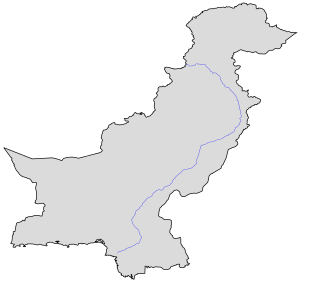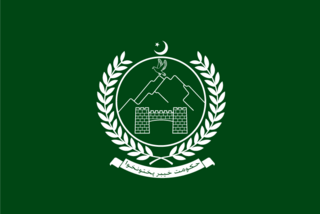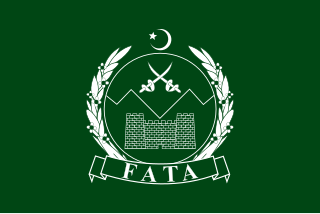Related Research Articles

Khyber Pakhtunkhwa, formerly known as the North-West Frontier Province (NWFP), is one of the four administrative provinces of Pakistan, located in the northwestern region of the country along the International border with Afghanistan.

The administrative units of Pakistan consist of four provinces, two autonomous territories and one federal territory. Moreover, it also claims union territories of Jammu and Kashmir and Ladakh, currently controlled by India. Each province and territory is subdivided into divisions, which are further subdivided into districts, which are further subdivided into tehsils, or taluka, which are further subdivided into union councils.

The Districts of Pakistan, are the third-order administrative divisions of Pakistan, below provinces and divisions, but forming the first-tier of local government. In total, there are 154 districts in Pakistan including the Capital Territory and the districts of Azad Kashmir and Gilgit Baltistan. These districts are further divided into Tehsils, Union Councils.

The Government of Khyber Pakhtunkhwa is the provincial government of the province of Khyber Pakhtunkhwa, Pakistan. Its powers and structure are set out in the provisions of the 1973 Constitution, in which 32 districts come under its authority and jurisdiction. The government includes the cabinet, selected from members the Khyber Pakhtunkhwa Assembly, and the non-political civil staff within each department. The province is governed by a unicameral legislature with the head of government known as the Chief Minister. The Chief Minister, invariably the leader of a political party represented in the Assembly, selects members of the Cabinet. The Chief Minister and Cabinet are thus responsible the functioning of government and are entitled to remain in office so long as it maintains the confidence of the elected Assembly. The head of state of the province is known as the Governor, while the administrative boss of the province is Chief Secretary Khyber Pakhtunkhwa.
The paramilitary forces of Pakistan consist of various uniformed organisations largely equipped with light infantry weapons and charged with a range of internal and external duties.

Gomal Zam Dam is a multi-purpose gravity dam in South Waziristan Agency of Federally Administered Tribal Areas, Pakistan. The dam impounds the Gomal River, a tributary of the Indus River, at Khjori Kach, where the Gomal River passes through a narrow ravine. The purpose of the dam is irrigation, flood control and hydroelectric power generation. Construction of the dam began in August 2001 and was completed in April 2011. The powerhouse was completed in March 2013 and electricity production started in August 2013. The dam was officially inaugurated on 12 September 2013 by Minister for Water and Power Khawaja Muhammad Asif, along with the US Ambassador Richard G. Olson and Khyber Pakhtunkhwa Governor Shaukatullah Khan.

The N-5 or National Highway 5 is a 1819 km national highway in Pakistan, which extends from Karachi in Sindh to Torkham in Khyber Pakhtunkhwa. The N-5 is the longest national highway in Pakistan and serves as an important north–south road artery, starting from Karachi and extending through Hyderabad, Moro and Khairpur in Sindh before crossing into Punjab province where it passes through Multan, Sahiwal, Lahore, Gujranwala, Gujrat, Jhelum and Rawalpindi. At Rawalpindi, it turns westwards and passes through Attock Khurd before crossing the Indus River into Khyber Pakhtunkhwa to continue through Nowshera and Peshawar before entering the Khyber Pass and reaching the border town of Torkham in the FATA. Its total length is divided into 1021 km in Punjab, 671 km in Sindh, 127 km in Khyber Pakhtunkhwa and the remaining 38 km in the FATA. It is managed by the National Highway Authority.

Mehtab Abbasi is a Pakistani politician from Abbottabad who began his political career as an independent candidate in the 1985 election. He won seats in both the provincial and national assembly. He also won all subsequent elections up to that of 2013.

Edwardes College Peshawar is a government college which is the oldest higher education institution in Peshawar, the capital of Khyber Pakhtunkhwa Province in the Islamic Republic of Pakistan. The college, affiliated with the University of Peshawar, has about 3,000 students in sciences, arts and humanities, business administration, higher national diploma, and computer sciences.

Lieutenant-General Ali Muhammad Jan Aurakzai, is a retired three-star rank general officer in the Pakistan Army who served as the Corps Commander of XI Corps and the principle commander of the Western Command. As Commander, he commanded all military combat assets and oversaw the peaceful deployment of XI Corps in the Northern Areas and the Federally Administered Tribal Areas (FATA).

The Khyber Pakhtunkhwa Assembly is the unicameral legislative body of the Khyber Pakhtunkhwa province in Pakistan. It was established under Article 106 of the Constitution of the Pakistan. The assembly previously had 124 elected members, 99 regular seats, 22 seats reserved for women and 3 seats for Non-Muslims. After the merger of FATA with the Khyber Pakhtunkhwa Province, the assembly seats rose from 124 to 145 by adding 16 general seats, 4 seats reserved for women and 1 for a Non-Muslim.
Owais Ahmed Ghani, a mechanical engineer by profession, is the former governor of the Khyber Pakhtunkhwa province of Pakistan, who previously governed southwestern province of Balochistan for four and a half years.
The Pakistan Cycling Federation or PCF is the national governing body of cycle racing in Pakistan. Pakistan Cycling Federation was established in 1947 and is based in Peshawar. PCF's main Road bicycle racing event is the Tour de Pakistan.

The Federally Administered Tribal Areas was a semi-autonomous tribal region in northwestern Pakistan that existed from 1947 until being merged with neighboring province Khyber Pakhtunkhwa in 2018. It consisted of seven tribal agencies (districts) and six frontier regions, and were directly governed by Pakistan's federal government through a special set of laws called the Frontier Crimes Regulations. It bordered Pakistan's provinces of Khyber Pakhtunkhwa, Balochistan, and Punjab to the east, south, and south-east respectively, and Afghanistan's provinces of Kunar, Nangarhar, Paktia, Khost and Paktika to the west and north. The territory is almost exclusively inhabited by the Pashtun, who also live in the neighbouring provinces of Khyber Pakhtunkhwa and Northern Balochistan, and straddle across the border into Afghanistan. They are mostly Muslim.

The province of Khyber Pakhtunkhwa, the third-largest province of Pakistan by population and the smallest province by area, is divided into 35 districts and seven divisions. Below, you will find an overview of the recent history of districts in Khyber Pakhtunkhwa, a map showing each district, the divisions of Khyber Pakhtunkhwa and their districts, and a list showing each district's name, the division the district belongs to, the district's area, the location of the district's headquarters, the district's population and population density, the average annual population growth rate of each district, and a map showing each district's location.

Gandao Dam, officially Abdul Shakoor Dam since December 2019, is a gravity dam built near town of Ghalanai in Mohmand Agency of FATA, Pakistan. It was initially is expected to complete in 2015, with projected cost of PKR 449 Millions.

Dr. Mohammad Tahir Shah is a professor at the National Centre of Excellence in Geology at the University of Peshawar. He had been selected as the vice-chancellor of the Fata University by the Governor Khyber Pakhtunkhwa Sardar Mahtab Ahmad Khan. He became the director of the National Centre of Excellence in Geology at the University of Peshawar in 2013 and served there for more than 34 years.
Development programs in Tribal Areas are the various humanitarian, development and relief projects carried out by the Sarhad Rural Support Programme (SRSP) in the Federally Administered Tribal Areas (FATA) of Pakistan.
Administrative System of FATA was the system by which semi-autonomous tribal region of Federally Administered Tribal Areas was governed.
The Twenty-fifth Amendment of the Constitution of Pakistan, officially known as the Constitution Act, 2018, was passed by the Parliament of Pakistan and the Khyber Pakhtunkhwa Assembly in May 2018. Under the amendment, the Federally Administered Tribal Areas (FATA) are to be merged with the province of Khyber Pakhtunkhwa (KP).
References
- 1 2 Report, Bureau (August 24, 2019). "KP govt dissolves Fata Development Authority". DAWN.COM.
- ↑ "FATA Development Authority prepares development program for new financial year 2009-10. - Free Online Library". www.thefreelibrary.com.